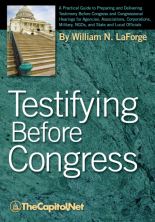From the Congressional Glossary – Including Legislative and Budget Terms
Optics
Optical illusions show how we see | Beau Lotto
A “term of art for how a bit of news will be perceived by the public at large, which is only used by people who bill by the hour.”
— Troy Senik
“The branch of physics which involves the behavior and properties of light, including its interactions with matter and the construction of instruments that use or detect it.”
— Wikipedia
“The viewing lens of public perception. How the media will play a story. Political repercussions are all about optics. Bad optics would be giving the media or the political opposition a juicy story to play with.”
— Urban Dictionary
The Wizard of Oz: Pay No Attention
How did optics achieve buzzword status in American politics? In his final On Language column last September, William Safire noted the trend: “‘Optics’ is hot, rivaling content.” When politicians fret about the public perception of a decision more than the substance of the decision itself, we’re living in a world of optics. Of course, elected officials have worried about outward appearances since time immemorial, but optics puts a new spin on things, giving a scientific-sounding gloss to P.R. and image-making.
Though the metaphorical expansion of optics into the political arena feels novel, it has actually been brewing for a few decades. On May 31, 1978, The Wall Street Journal quoted Jimmy Carter’s special counselor on inflation, Robert Strauss, as saying that business leaders who went along with Carter’s anti-inflation measures might be invited to the White House as a token of appreciation. “It would be a nice optical step,” Strauss said. The Journal was not impressed by the idea: the following day, an editorial rebuffed Strauss’s overtures with the line “Optics will not cure inflation.”
“Optics,” by Ben Zimer, The New York Times, March 4, 2010
MadTV – Wizard of Oz (Alternate Ending)
“The optics of a Solyndra default will be bad,” the Office of Management and Budget staff member wrote Jan. 31 in an e-mail to a co-worker. “If Solyndra defaults down the road, the optics will be arguably worse later than they would be today. . . . In addition, the timing will likely coincide with the 2012 campaign season heating up.”
“Obama administration e-mails: Giving more taxpayer money to Solyndra was risky,” by Carol D. Leonnig and Joe Stephens, The Washington Post, September 15, 2011
Also see Fiscal Illusion; The Shadow of Enlightenment: Optical and Political Transparency in France 1789-1848.
More
- “The ‘Optics’ of Political Communication,” by Dan Schill, Communication Currents, April 2012
- “The increasingly odd political optics of Barack Obama,” by Andrew Malcolm, The Los Angeles Times, April 26, 2011
- “The Optics of Obama’s Youth Appeal,” by Molly Ball, The Atlantic, May 4, 2012
- “Obama’s Optics Problem on Display With Paris No-Show,” by George E. Condon Jr., The Atlantic, January 12, 2015
- “Navy Lasers, Railgun, and Gun-Launched Guided Projectile: Background and Issues for Congress,” CRS Report R44175 (47-page PDF
 )
) - “Defense Acquisitions: How and Where DOD Spends Its Contracting Dollars,” CRS Report R44010 (34-page PDF
 )
)
The high art — and power — of political stagecraft in the age of optics
Courses
- Congressional Operations Briefing – Capitol Hill Workshop
- Drafting Federal Legislation and Amendments
- Writing for Government and Business: Critical Thinking and Writing
- Custom, On-Site Training
- Preparing and Delivering Congressional Testimony and Oral Presentations, a Five-Course series on CD
- Congress, the Legislative Process, and the Fundamentals of Lawmaking Series, a Nine-Course series on CD
Publications

Testifying Before Congress

Pocket Constitution

Citizen’s Handbook to Influencing Elected Officials: A Guide for Citizen Lobbyists and Grassroots Advocates

Congressional Procedure
CongressionalGlossary.com, from TheCapitol.Net
For more than 40 years, TheCapitol.Net and its predecessor, Congressional Quarterly Executive Conferences, have been teaching professionals from government, military, business, and NGOs about the dynamics and operations of the legislative and executive branches and how to work with them.
Our custom on-site and online training, publications, and audio courses include congressional operations, legislative and budget process, communication and advocacy, media and public relations, testifying before Congress, research skills, legislative drafting, critical thinking and writing, and more.
TheCapitol.Net is on the GSA Schedule, MAS, for custom on-site and online training. GSA Contract GS02F0192X
TheCapitol.Net is now owned by the Sunwater Institute.
Teaching how Washington and Congress work ™

